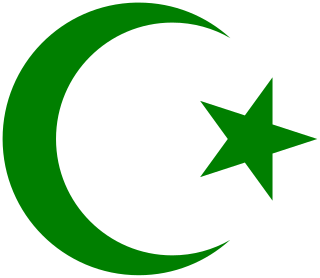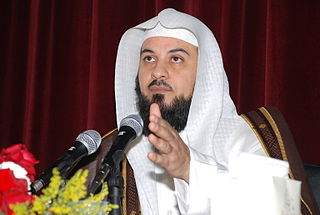
Islamism is a concept whose meaning has been debated in both public and academic contexts. The term can refer to diverse forms of social and political activism advocating that public and political life should be guided by Islamic principles or more specifically to movements which call for full implementation of sharia. It is commonly used interchangeably with the terms political Islam or Islamic fundamentalism. In academic usage, the term Islamism does not specify what vision of "Islamic order" or sharia are being advocated, or how their advocates intend to bring them about. In Western mass media it tends to refer to groups whose aim is to establish a sharia-based Islamic state, often with implication of violent tactics and human rights violations, and has acquired connotations of political extremism. In the Muslim world, the term has positive connotations among its proponents.

The Society of the Muslim Brothers, better known as the Muslim Brotherhood, is a transnational Sunni Islamist organization founded in Egypt by Islamic scholar and schoolteacher Hassan al-Banna in 1928. The organization gained supporters throughout the Arab world and influenced other Islamist groups such as Hamas with its "model of political activism combined with Islamic charity work", and in 2012 sponsored the elected political party in Egypt after the January Revolution in 2011. However, it faced periodic government crackdowns for alleged terrorist activities, and as of 2015 is considered a terrorist organization by the governments of Bahrain, Egypt, Russia, Syria, Saudi Arabia and the United Arab Emirates.

Wahhabism is an Islamic doctrine and religious movement founded by Muhammad ibn Abd al-Wahhab. It has been variously described as "ultraconservative", "austere", "fundamentalist", or "puritan(ical)"; as an Islamic "reform movement" to restore "pure monotheistic worship" (tawhid) by devotees; and as a "deviant sectarian movement", "vile sect" and a distortion of Islam by its opponents. The term Wahhabi(ism) is often used polemically and adherents commonly reject its use, preferring to be called Salafi or muwahhid. claiming to emphasize the principle of tawhid, for exclusivity on monotheism, dismissing other Muslims as practising shirk, (idolatry). It follows the theology of Ibn Taymiyyah and the Hanbali school of jurisprudence, although Hanbali leaders renounced Abd al-Wahhab's views.

The Salafi movement, also called Salafist movement, Salafiya, and Salafism, is a reform branch or revivalist movement within Sunni Islam that developed in Egypt in the late 19th century as a response to Western European imperialism, with roots in the 18th-century Wahhabi movement that originated in the Najd region of modern day Saudi Arabia. It advocated a return to the traditions of the salaf, the first three generations of Muslims, which include the generations of the Islamic Prophet Muhammad and his companions, their successors, and the successors of the successors.

Hugngnman rights in Saudi Arabia are the subject of protection or violation by the government, which enforces Wahhabi religious laws under absolute rule of the Saudi royal family.

Islam is the state religion of Saudi Arabia. The connection between Islam and Saudi Arabia is uniquely strong. The kingdom, which sometimes is called the "home of Islam", is the location of the cities of Mecca and Medina, where Muhammad, the messenger of the Islamic faith, lived and died, and attracts millions of Muslim Hajj pilgrims annually, and thousands of clerics and students who come from across the Muslim world to study. The official title of the King of Saudi Arabia is "Custodian of the Two Holy Mosques"—the two being Al-Masjid al-Haram in Mecca and Al-Masjid al-Nabawi in Medina—which are considered the holiest in Islam.
Kurdistan Islamic Union ; Arabic: الاتحاد الاسلامي الكوردستاني, translit. al-Ittiḥād al-islāmī al-kūrdistānī), colloquially referred to as Yekgirtû, is an Islamist party in Iraqi Kurdistan.

Abu 'Abd Allah Muhammad ibn Saalih ibn Muhammad ibn Sulayman ibn Abd Al Rahman Al Uthaymeen Al Tamimi was a Salafi scholar of Saudi Arabia who was considered "a giant within conservative Salafi Islam".

Tareq Mohammed Al-Suwaidan is a Kuwaiti writer, historian, businessman, and Muslim scholar, He is Chairman of "Innovation Group". He is well known in the Middle East and in Muslim communities throughout the world for his management/strategic planning training, and television shows and appearances. According to Forbes magazine, Al-Suwaidan ranks second in annual net income among Islamic speakers in the Muslim world with an estimated net profit of $1 million in 2007. Al-Suwaidan was trained in the classical Islamic sciences in his youth and lived and studied in the United States from the age of 17 and remained for 20 years, graduating from high school, and receiving a B.S. in petroleum and natural gas engineering from Penn State University in 1975 and an M.Sc. and Ph.D. in 1990 in petroleum engineering from the University of Tulsa.
‘Abdu’l-‘Azīz ibn ‘Abdu’llāh ibn Muḥammad ibn ‘Abdu’l-Laṭīf Āl ash-Sheikh is a Muslim scholar and the current Grand Mufti of Saudi Arabia. As Grand Mufti, he is the head of the Permanent Committee for Islamic Research and Issuing Fatwas.
The Permanent Committee for Scholarly Research and Ifta is an Islamic organization in Saudi Arabia established by the King that issues rulings in Islamic jurisprudence (fiqh) and prepares research papers for the Council of Senior Scholars, which advises the king on religious matters. Its members are drawn from the Council of Senior Scholars, of which it is a committee, and consist of the most senior Sunni scholars of fiqh in Saudi Arabia, including the Grand Mufti of Saudi Arabia as its head. The issuance of fataawa in Saudi Arabia is limited to members of the Council of Senior Scholars and a few other clerics.
Saud Ali Kariri is a Saudi Arabian footballer who plays as a midfielder, and who previously played with Al Ittihad. He also previously played for Al-Qadisiyah the team that introduced most of Saudi football stars.
Al-Resalah is an Arabic language satellite television channel "to present true Islam".
Abdul-Rahman bin Nasir al-Barrak is a Saudi Salafi cleric.

The Yemeni Congregation for Reform, frequently called al-Islah, is a Yemeni Islamist party founded in 1990 by Abdullah ibn Husayn al-Ahmar, Ali Mohsen al-Ahmar, Abdul Majeed al-Zindani, Mohammed al-Yadumi and Yahya Rassam. The first article of Islah basic law defines it as "a popular political organization that seeks reform of all aspects of life on the basis of Islamic principles and teachings".
Dr. Ali Muhammad al-Sallabi, or al-Salabi is a Muslim cleric, religious scholar and Islamist politician from Libya. He was arrested by the Gaddafi regime, then left Libya and studied Islam in Saudi Arabia and Sudan during the 1990s. He then studied in Qatar under Yusuf al-Qaradawi, the spiritual head of the international Muslim Brotherhood and returned to Libya during the 2011 overthrow of Gaddafi and distributed weapons, money and aid to Islamist groups in the country. His actions were criticized by members of the internationally recognized Libyan government under the National Transitional Council who he in turn criticized as being secular.

" International Association of Muslim Scholars, IAMS " ; Arabic: الاتحاد العالمي لعلماء المسلمين al-Ittiḥād al-ʻĀlamī li-ʻUlāmāʼ al-Muslimīn), and formerly translated as the International Association of Muslim Scholars, IAMS) is a controversial organization of Muslim Islamic theologians headed by Ahmad al-Raysuni to replace Yusuf al-Qaradawi, described as the "supreme authority of the Muslim Brotherhood", founded in 2004, and headquartered in Qatar.
Saudi Arabians, or Saudis are a nation composed mainly of various regional ethnic groups who are native to the Arabian Peninsula including Hejazis, Najdis, Hassawis, Southern Arabs and others including non-Arabs, who share a common general Saudi culture and a Saudi nationality. Saudis speak one of the accents and dialects of the Peninsular Arabic, including the Hejazi, Najdi, Gulf and Southern Arabic dialects, as a mother tongue. According to the 2010 census, Saudi nationals represented approximately 19,335,377 making up 74.1% of the total population. Saudi Arabia is a state governed by absolute monarchy, with the king as its head of state.

Mohamad bin Abdel-Rahman al-ʿArefe is a Salafi author and scholar. He is a graduate of King Saud University, and Member of the Muslim World League and the Association of Muslim Scholars.

Muhammad Rizieq Shihab also known as Habib Rizieq is an Indonesian Islamist scholar, the founder and leader of the Islamist group Islamic Defenders Front. He currently resides in Riyadh, Saudi Arabia.













